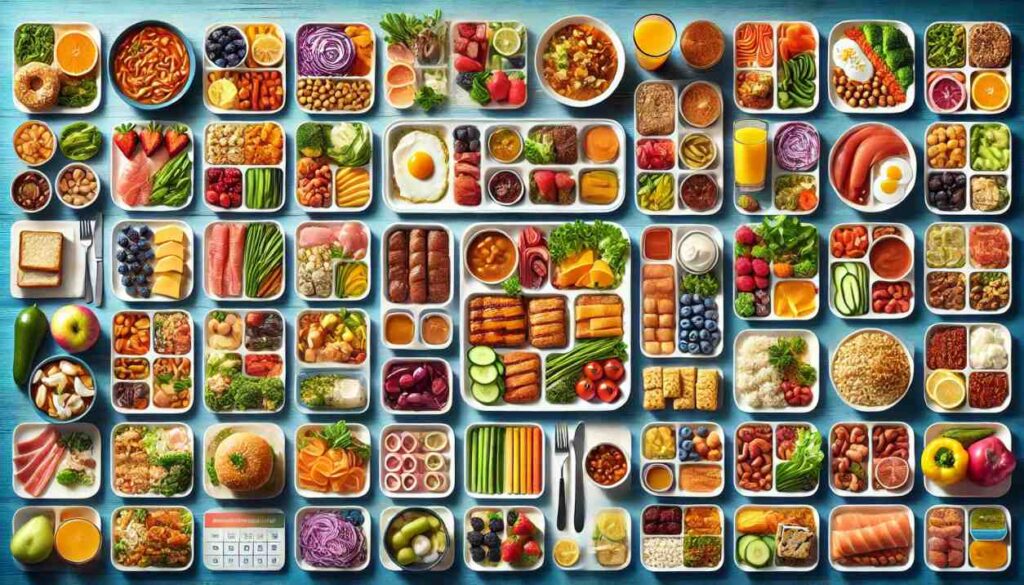
Our product evaluations are completely independent and free from advertisements. Should you make a purchase via the links on our website, we might receive a small commission, which is a key support for our review process. For more details, click here.
In the world of health and wellness, weight loss programs offer a structured approach to shedding pounds, improving health, and maintaining long-term success. With so many programs available, it can be overwhelming to choose the right one. Whether you are seeking a program that offers flexibility, personal coaching, meal delivery, or a structured plan, there’s likely a weight loss program that fits your lifestyle and goals.
In this guide, we will explore some of the most popular and effective weight loss programs, including their unique features, benefits, and potential challenges. Whether you’re looking to lose weight quickly or adopt a long-term healthy lifestyle, this article will help you find the right program for your needs.
1. WeightWatchers (WW)

Key Features
WW is one of the most well-known weight loss programs, based on a point system where every food and drink is assigned a SmartPoints value. The program encourages balanced eating by promoting healthier food choices like fruits, vegetables, lean proteins, and whole grains. WW also emphasizes behavioral changes through support meetings, online tools, and coaching.
Health Benefits
- Flexibility: WW allows members to eat their favorite foods as long as they stay within their SmartPoints budget.
- Sustainable Weight Loss: Encourages a slow and steady approach to weight loss, promoting lasting results.
- Community Support: In-person and virtual meetings help build a sense of accountability and motivation.
Potential Challenges
The point-tracking system can be time-consuming, and those who prefer a more structured meal plan may find WW’s flexibility too open-ended.
2. Volumetrics Diet
Key Features
The Volumetrics Diet focuses on the concept of energy density, encouraging dieters to consume foods that are low in calories but high in volume, such as fruits, vegetables, and broth-based soups. This allows individuals to feel full while consuming fewer calories. The diet emphasizes eating foods with high water content and low energy density, which can help control hunger and reduce calorie intake.
Health Benefits
- Promotes Satiety: Eating high-volume, low-calorie foods helps curb hunger.
- Sustainable: It encourages a balanced diet, making it easier to follow long-term.
- Improves Digestion: The emphasis on fiber-rich foods supports healthy digestion.
Potential Challenges
The diet requires careful meal planning and might not appeal to those who prefer richer, more calorie-dense foods.
3. Noom
Key Features
Noom is a modern, app-based weight loss program that combines psychology with personalized coaching to help users adopt healthier habits. The program uses a traffic-light system to classify foods into green (nutrient-dense, low-calorie), yellow (moderate-calorie), and red (high-calorie) categories. It also focuses on daily logging and behavior change to foster sustainable weight loss.
Health Benefits
- Behavioral Focus: The program helps users understand the psychological triggers behind eating habits.
- Personalized Coaching: Users have access to coaches who provide motivation and guidance.
- Long-Term Success: The emphasis on habit formation supports lasting lifestyle changes.
Potential Challenges
Noom’s daily food logging and app usage may feel overwhelming for those who prefer less structure, and the subscription cost can be prohibitive for some users.
4. Nutrisystem
Key Features

Nutrisystem is a meal-delivery program that provides pre-portioned, ready-to-eat meals designed to help users lose weight. The program simplifies weight loss by controlling portion sizes and providing balanced meals, making it easy for users to stick to their goals without worrying about meal prep or grocery shopping.
Health Benefits
- Convenience: Nutrisystem’s pre-packaged meals eliminate the need for meal planning and cooking.
- Portion Control: Meals are designed to provide balanced nutrition and prevent overeating.
- Quick Results: Many users see rapid weight loss due to the calorie-controlled nature of the program.
Potential Challenges
Some users find the packaged meals less flavorful or enjoyable compared to fresh home-cooked meals. Additionally, the cost of ongoing meal delivery can add up over time.
5. SlimFast Diet
Key Features
The SlimFast Diet revolves around meal replacement shakes, bars, and snacks. Users replace two meals per day with SlimFast products and eat one healthy meal, typically dinner. The program also encourages low-calorie snacks to keep hunger at bay throughout the day.
Health Benefits
- Simple and Convenient: The structure of the diet is easy to follow, making it ideal for those who want a straightforward plan.
- Portion Control: The meal replacement strategy helps manage portion sizes and calorie intake.
- Rapid Weight Loss: Many people experience quick weight loss in the initial phase due to the calorie restriction.
Potential Challenges
Relying on meal replacement products may lead to boredom or dissatisfaction with the lack of variety. Additionally, long-term sustainability may be a concern once users transition off the products.
6. WW Reimagined
Key Features
WW Reimagined is an updated version of WeightWatchers, integrating modern technology with the traditional point-based system. It provides digital tracking tools, personalized wellness plans, and access to virtual coaching and community support. WW Reimagined takes a more holistic approach, focusing on overall wellness rather than just weight loss.
Health Benefits
- Personalization: The program tailors plans to individual goals, whether it’s weight loss, fitness, or mental health.
- Flexibility: Users can choose the level of involvement they want, from digital-only to in-person support.
- Holistic Approach: Focuses on mental, emotional, and physical wellness.
Potential Challenges
The personalization aspect may overwhelm some users with too many options, and the cost of premium memberships can be high.
7. Optavia Diet
Key Features
The Optavia Diet focuses on structured meal plans combined with personalized coaching. Participants eat six small meals a day, consisting of five Optavia “fuelings” (meal replacements like bars, shakes, or soups) and one “lean and green” meal they prepare themselves. The diet is designed to provide steady energy while promoting fat loss.
Health Benefits
- Portion Control: The pre-packaged fuelings simplify meal planning and portion control.
- Coaching Support: Personal coaches provide accountability and guidance.
- Fast Results: Many users see quick weight loss due to the structured meal plan.
Potential Challenges
The heavy reliance on packaged meal replacements may feel restrictive, and the cost of purchasing Optavia products can add up over time.
8. Cambridge Weight Plan
Key Features

The Cambridge Weight Plan offers meal replacement shakes, soups, and bars that are nutritionally balanced to help with weight loss. The program is divided into six steps, starting with very low-calorie meal replacements and gradually introducing real food. The plan is personalized based on individual weight loss goals, and consultants provide one-on-one support.
Health Benefits
- Effective Weight Loss: The strict calorie control leads to rapid weight loss in the initial stages.
- Support System: Personal consultants offer tailored advice and motivation.
- Structured Plan: The gradual reintroduction of food helps maintain long-term success.
Potential Challenges
The early stages of the plan can be difficult due to the very low-calorie intake, and some people may struggle with the transition back to regular food.
9. Slimming World Diet
Key Features
Slimming World is a UK-based weight loss program that focuses on “Free Foods” (foods you can eat freely, like fruits, vegetables, and lean proteins) and “Syns” (higher-calorie foods that should be limited). The program encourages healthy eating habits and allows flexibility for treats within the Syns system.
Health Benefits
- Flexibility: Slimming World offers a balanced approach that allows for indulgence within limits.
- Group Support: Weekly group meetings provide motivation and accountability.
- Sustainable: The focus on whole foods makes it easier to adopt as a long-term lifestyle.
Potential Challenges
Those who prefer more structured meal plans may find the freedom of the Syns system challenging. Additionally, the program’s flexibility may lead to slower weight loss for some individuals.
10. HCG Diet
Key Features
The HCG Diet combines a very low-calorie diet (VLCD) with hormone injections or supplements of human chorionic gonadotropin (HCG). The diet typically restricts intake to 500-800 calories per day while the HCG hormone is believed to suppress hunger and promote fat burning.
Health Benefits
- Rapid Weight Loss: The severe calorie restriction leads to quick weight loss.
- Appetite Suppression: HCG is thought to reduce hunger, making the low-calorie intake more tolerable.
Potential Challenges
The extreme calorie deficit and reliance on hormone injections make this diet highly controversial. Many healthcare professionals do not recommend it due to safety concerns, and the potential for nutrient deficiencies is high. It’s recommended to consult your doctor before this diet.
11. The Cambridge Diet
Key Features
The Cambridge Diet is similar to the Cambridge Weight Plan and is based on very low-calorie meal replacements. It is typically used for short-term weight loss and involves drinking shakes, soups, and bars while following a strict calorie-controlled plan.
Health Benefits
- Rapid Weight Loss: The very low-calorie diet promotes fast fat loss.
- Simple Structure: The focus on meal replacements makes it easy to follow.
- Nutritionally Balanced: Despite the low-calorie intake, the products are designed to be nutritionally balanced, providing essential vitamins and minerals during the weight loss process.
Potential Challenges
The extreme calorie restriction can make the diet difficult to sustain over the long term. Additionally, transitioning from meal replacements to real food requires careful planning to avoid weight regain.
12. 17 Day Diet
Key Features

The 17 Day Diet consists of four 17-day cycles, each focusing on different aspects of weight loss and healthy eating. The first phase is the most restrictive, focusing on lean proteins, low-glycemic vegetables, and probiotics. As you progress through the cycles, more foods are gradually introduced.
Health Benefits
- Phased Approach: The gradual increase in variety helps prevent weight loss plateaus and ensures long-term success.
- Focus on Healthy Habits: Each cycle introduces new healthy eating practices that can be adopted for life.
- Supports Digestion: The inclusion of probiotics promotes gut health.
Potential Challenges
The restrictive nature of the first cycle can be difficult for some people to follow, and meal planning can be time-consuming due to the frequent changes in the diet.
13. Medifast Diet
Key Features
The Medifast Diet, now known as OPTAVIA, is a meal replacement program that helps users lose weight by consuming pre-packaged meals. It emphasizes low-calorie, nutritionally balanced “fuelings” that are consumed five times per day, along with one self-prepared lean and green meal.
Health Benefits
- Convenience: Pre-packaged meals simplify meal planning and portion control.
- Portion-Controlled: The fuelings are calorie-controlled, helping users avoid overeating.
- Rapid Weight Loss: The calorie restriction leads to quick results, making it popular for short-term weight loss.
Potential Challenges
The reliance on meal replacements may lead to boredom, and transitioning back to real food after the program can be challenging for some users.
14. Jenny Craig
Key Features
Jenny Craig is a comprehensive weight loss program that combines pre-packaged meals with personal coaching. Members receive portion-controlled meals delivered to their door, along with access to one-on-one support from a personal consultant. The program also includes a fitness component to encourage physical activity.
Health Benefits
- Personalized Support: The coaching aspect provides accountability and motivation.
- Convenience: Ready-made meals take the guesswork out of meal planning.
- Balanced Nutrition: Meals are designed to provide balanced nutrition while promoting weight loss.
Potential Challenges
The cost of the program, including meal delivery and coaching, can be high. Additionally, once users transition off the pre-packaged meals, they may struggle to maintain their weight loss.
15. The 3-Day Diet
Key Features
The 3-Day Diet is a short-term, low-calorie diet that promises rapid weight loss. It involves eating a strict menu of very low-calorie foods, such as grapefruit, tuna, and eggs, over the course of three days, followed by four days of normal eating. The cycle can be repeated until the desired weight is achieved.
Health Benefits
- Quick Weight Loss: The extreme calorie restriction leads to rapid fat loss over the three days.
- Simple and Short: The program is easy to follow for a short period of time.
Potential Challenges
The diet is highly restrictive and can lead to nutrient deficiencies if followed for extended periods. Additionally, most of the weight lost is likely to be water weight, which can be regained once normal eating resumes.
16. Five-Bite Diet
Key Features

The Five-Bite Diet is an extreme weight loss program that encourages dieters to skip breakfast and then eat only five bites of food for lunch and five bites for dinner, regardless of the type of food. The premise is that by eating fewer calories, the body will burn fat for energy.
Health Benefits
- Rapid Weight Loss: The extreme calorie restriction leads to fast results.
- No Food Restrictions: Dieters can eat any type of food they like, as long as they stick to the five-bite rule.
Potential Challenges
This diet is highly controversial due to its extreme nature and the potential for nutrient deficiencies. The severe calorie restriction is not sustainable long-term, and most healthcare professionals do not recommend it as a healthy approach to weight loss.
17. Fast 800 Diet
Key Features
The Fast 800 Diet, developed by Dr. Michael Mosley, is based on intermittent fasting and a Mediterranean-style low-carb diet. It involves consuming 800 calories per day for a short period (2-12 weeks), followed by a more sustainable eating pattern with two fasting days per week.
Health Benefits
- Intermittent Fasting: The fasting element can help improve insulin sensitivity and promote fat burning.
- Mediterranean Focus: The emphasis on whole foods, healthy fats, and lean proteins supports heart health and longevity. Check out our Plant-Based Diet page for more Mediterranean like diets.
- Rapid Weight Loss: The initial 800-calorie phase promotes quick fat loss.
Potential Challenges
The initial phase can be difficult to maintain due to the severe calorie restriction, and some people may struggle with hunger or fatigue during the fasting periods.
18. Mayo Clinic Diet
Key Features
The Mayo Clinic Diet emphasizes long-term healthy habits and lifestyle changes rather than quick fixes. The program is divided into two phases: “Lose It!” and “Live It!” During the Lose It! phase, participants focus on changing unhealthy habits and losing weight, while the Live It! phase teaches how to maintain the weight loss through balanced eating and regular physical activity.
Health Benefits
- Healthy, Sustainable Weight Loss: The focus on lifestyle changes promotes lasting results.
- Balanced Nutrition: The diet encourages a wide variety of nutrient-rich foods.
- Holistic Approach: The program promotes overall health, including physical, mental, and emotional well-being.
Potential Challenges
The focus on slow and steady weight loss may not appeal to those looking for rapid results. Additionally, the self-directed nature of the program requires a high level of commitment and motivation.
Frequently Asked Questions
Finding the Right Path for Weight Loss
Weight loss programs offer diverse options to suit different lifestyles and preferences. Whether you’re drawn to the convenience of meal delivery with Nutrisystem, the behavioral coaching of Noom, or the group support of WeightWatchers, the key is finding a program that not only helps you lose weight but also fosters long-term healthy habits.
Ready to start your journey? Explore the programs above to find the one that fits your goals, and take your first step toward a healthier, happier you!